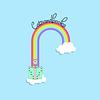Take a photo of a barcode or cover
“The skein talks back to him. It says: I’m ready. It says: Come on, my son. It says: Whatever you need, I’ve got it. Power doesn’t care who uses it. The skein doesn’t rebel against him, doesn’t know that he’s not its rightful mistress. It just says: Yes. Yes, I can. Yes. You’ve got this.”
This book. I went into this book knowing only that it was dystopian and based on women gaining power in their lives. Interesting concept, given the current political environment, but it was so much more, and literally made me sit back hard. In the early stages, you cheer the women taking back their power and sense of control. But then it changes, and Alderman takes a careful look at the corrupting nature of power and control. She evokes images of WWII and the persecution of so many groups of people that the Germans felt were inferior. There are references to female genital mutilation, sex selection, and the rewriting of history to suit a current political or societal agenda.
Beautiful pacing and well-developed characters. Alderman has an impeccable writing style, and she draws her readers in completely. Her descriptions are evocative, and while there is episodes of physical violence and sexual assault, she utilizes the moments effectively. This book deserves all of the rewards it is going to receive.
This book. I went into this book knowing only that it was dystopian and based on women gaining power in their lives. Interesting concept, given the current political environment, but it was so much more, and literally made me sit back hard. In the early stages, you cheer the women taking back their power and sense of control. But then it changes, and Alderman takes a careful look at the corrupting nature of power and control. She evokes images of WWII and the persecution of so many groups of people that the Germans felt were inferior. There are references to female genital mutilation, sex selection, and the rewriting of history to suit a current political or societal agenda.
Beautiful pacing and well-developed characters. Alderman has an impeccable writing style, and she draws her readers in completely. Her descriptions are evocative, and while there is episodes of physical violence and sexual assault, she utilizes the moments effectively. This book deserves all of the rewards it is going to receive.
This story took awhile to get my attention, and even at the end I'm not sure if I really connected that much to any of the characters. I think Gin and Mattie were the most interesting to me, while Ro and Susan just got on my nerves by the end.
Even so, I really enjoyed the way Zumas writes, especially about thoughts and fantasies. She inhabited the minds of each of these women so well and I felt a poetic immediacy that was fascinating. Some lines are just absolutely lovely to read, and really capture a certain feeling or mood.
What I think of when I think of this book are our narrators, the women whose lives we caught a brief glimpse into. The plot seemed secondhand, and even the restrictions placed upon women who wish to have, or not have, children, didn't impact me as much as I thought they would. I think maybe this was because this all seemed so normal to each of the characters. While Ro offered the strongest rebuttal against such laws, no one really had a fiery reaction. And I think that is likely part of the point—we all get used to it, and get wrapped up in our own lives and our own concerns that we don't bother to think of what other people might be experiencing until we have to deal with it ourselves.
So in that sense, I do think Zumas did a smart thing by writing this story in that manner. I do wish I had a stronger emotional connection to this story and these women. I'm not sure what really stood in the way of me connecting with anyone, but there was some thin wall that kept us apart. Even so, I think this is a valuable story to read and think about, even if it wasn't the most thrilling thing I've ever read. I would definitely recommend.
Even so, I really enjoyed the way Zumas writes, especially about thoughts and fantasies. She inhabited the minds of each of these women so well and I felt a poetic immediacy that was fascinating. Some lines are just absolutely lovely to read, and really capture a certain feeling or mood.
What I think of when I think of this book are our narrators, the women whose lives we caught a brief glimpse into. The plot seemed secondhand, and even the restrictions placed upon women who wish to have, or not have, children, didn't impact me as much as I thought they would. I think maybe this was because this all seemed so normal to each of the characters. While Ro offered the strongest rebuttal against such laws, no one really had a fiery reaction. And I think that is likely part of the point—we all get used to it, and get wrapped up in our own lives and our own concerns that we don't bother to think of what other people might be experiencing until we have to deal with it ourselves.
So in that sense, I do think Zumas did a smart thing by writing this story in that manner. I do wish I had a stronger emotional connection to this story and these women. I'm not sure what really stood in the way of me connecting with anyone, but there was some thin wall that kept us apart. Even so, I think this is a valuable story to read and think about, even if it wasn't the most thrilling thing I've ever read. I would definitely recommend.
I so badly wanted to like this book, but it fell flat for me. Advertised as a modern "Handmaids Tale," which I love, I was excited to read this book. Red Clocks did not live up to the hype though. It started out slow and depressing, picked up briefly, and then slowed to a short and unfulfilling end. I tried to feel connected to the characters, but I felt the book was lacking that emotional pull. Overall it was just OK.
Red Clocks took me a while to get into, though it was enjoyable from beginning to end. I couldn’t help a feeling that I was always waiting for something to happen, and I still feel like I never really crossed that bridge. However, I think it was my expectations coming into it that there would be some major Handmaid’s Tale or Vox-esque dystopian horror show, but there just wasn’t. And I think that is what is so amazing about this novel. It’s so close to home and close to reality in the US. Roe v. Wade is ALWAYS on the table to be reversed, and that’s what the novel is based on. It gives a glimpse into what the US would look like 5ish years after Roe v. Wade is overturned. It is painful and inspiring and thought provoking and intriguing. Like a train wreck - couldn’t stop reading.
On top of that, the stories of each of the 5 women are engaging and interesting. I felt true love and compassion towards each of them, despite their differences and flaws. Truly I think the book is more about the resilience, ingenuity, and tenacity of women more than it’s about a horrifying and discriminatory future. I loved it.
On top of that, the stories of each of the 5 women are engaging and interesting. I felt true love and compassion towards each of them, despite their differences and flaws. Truly I think the book is more about the resilience, ingenuity, and tenacity of women more than it’s about a horrifying and discriminatory future. I loved it.
The 'personhood amendment' has made abortion and ivf illegal in the USA. This book explores the impact of this on four women's lives, identities, choices and opportunities. But familiar social expectations and the way these women see themselves has just as much of an impact. This book is good and definitely worth reading, but it didn't totally blow my mind. I did really like that the main character was trying to conceive a child as a single mum using a sperm donor, since this is how I had my baby.
I listened to this on audio and it was fantastic. I love the different stories of women in the not so distant future and the elegant prose that brought the whole thing together. There was some weird, antiquated language used which sometimes through me off, but it definitely made me look forward to my commute.
Interesting series of perspectives. I had a hard time with this book. Not because it wasn't good, but because it hit a little too close to home.
This is one of the best books I've read in a year or two. Absolutely phenomenal.
Unfortunately it's timely AF.
Unfortunately it's timely AF.
inspiring
reflective
medium-paced
Strong character development:
Yes
Loveable characters:
No
Diverse cast of characters:
Yes
Flaws of characters a main focus:
Complicated
This was an...interesting book.
What I did like:
-The alternating perspectives and interwoven narratives.
-The feeling that I was actually in the pacific northwest while reading the book. Lots of fog and rain and gloom in the writing.
-The contrast of the daughter and the biographer in regards to pregnancy (someone who wants it ripped from her body versus someone who wants to experience it more than anything)
What I didn't like:
-The polar explorer- what was her purpose?? I feel like I could have gotten more from the other four women had this story been omitted.
-The summary emphasizes the political climate of the United States during this time, but there's not much detail given in the book, other than brief references. I was hoping for more, as someone who enjoys political/dystopian novels.
-The entire thing seemed written in metaphors and euphemisms, and I missed out on the meanings.
I'm glad I borrowed this from the library rather than bought it. There was a lot of hype (it was a January 2018 Book of the Month) and I can't get on board.
What I did like:
-The alternating perspectives and interwoven narratives.
-The feeling that I was actually in the pacific northwest while reading the book. Lots of fog and rain and gloom in the writing.
-The contrast of the daughter and the biographer in regards to pregnancy (someone who wants it ripped from her body versus someone who wants to experience it more than anything)
What I didn't like:
-The polar explorer- what was her purpose?? I feel like I could have gotten more from the other four women had this story been omitted.
-The summary emphasizes the political climate of the United States during this time, but there's not much detail given in the book, other than brief references. I was hoping for more, as someone who enjoys political/dystopian novels.
-The entire thing seemed written in metaphors and euphemisms, and I missed out on the meanings.
I'm glad I borrowed this from the library rather than bought it. There was a lot of hype (it was a January 2018 Book of the Month) and I can't get on board.




